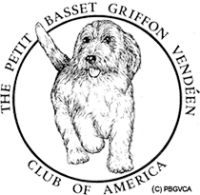Breeders’ Code of Best Practices
Revised 7/2019 1
The Petit Basset Griffon Vendéen Club of America’s core mission is to preserve the well‐being and unique character of the Breed. Mindful of this responsibility, the Club has identified three areas of concern that are essential to this mission: the selection of breeding stock, the maintenance of breeding stock and their whelp, and an ethical practice based on honesty, openness and commitment to the preservation of the breed.
Selecting Breeding Stock
The responsible breeder should:
Have a deep and broad understanding of the breed standard through self‐study as well as in consultation with mentors and other breeders taking advantage of learning opportunities presented by the Club at specialty shows or via distance learning and will select breeding stock with the standard in mind.
- Remember that the Petit Basset is first and foremost a hunting dog and to select dogs that demonstrate the structure and temperament necessary for this function.
- Breed only animals that have been tested for general health as well as for specific conditions of concern within the breed.
- To the extent possible, participate in activities with their breeding animals that provide opportunities to demonstrate that they have correct conformation, soundness and temperament specific to the breed.
Maintenance of Breeding Stock and Puppies
When selecting individual PBGVs for breeding the responsible breeder will:
- Insure that both sire and dam are AKC registered dogs that conform to the breed standard in both form and function, participating in conformation, performance and companion activities to the extent possible.
- Have all breeding stock tested for known genetic issues within the breed as well as general health assessment and regular veterinary care as needed. (1)
- Provide quality nutrition for all stock both before and after breeding and a clean and safe environment for whelping and puppy rearing.
- Monitor puppy growth to insure healthy development both physically and socially.
- Evaluate puppies prior to placement so that full registration can be obtained for those puppies with breeding potential and limited registration be available to those puppies for which breeding is inadvisable. (2)
- Immunize all puppies to the degree appropriate prior to placement. (3)
Breeders As Mentors
The Responsible Breeder:
- Will demonstrate honesty and openness in all transactions involving puppy sales and breeding services.
- Understands this is a lifetime commitment to the puppies who have been breed and sold and will take back or rehome puppies produced at any time for any reason. Screen potential buyers to ensure that puppies are placed in circumstances where their safety, health, and general well-being are protected.
- Provide AKC registration papers and a written agreement at time of sale which includes information about feeding, immunizations and instructions for initial care as well as details about health guarantees. Offer a 1-year PBGVCA Associate Membership to all puppy buyers at the special breeder rate of $25.
- Is the primary educator for puppy buyers and therefore is committed to providing advice and counsel to puppy buyers as requested throughout the life of the dog.
- Promotes the preservation of the breed by participating in open discussions and/or databases about health issues that arise from breedings in which they are involved.
- Recognizes the responsibility to serve as a mentor to the next generation of breeders.
As a member of the Petit Basset Griffon Vendéen Club of America, I have read and understand that it is recommended I abide by the above Breeders’ Code of Best Practices. I understand that this Breeders’ Code of Best Practices is applicable to all dogs bred, owned, co-owned or leased by or from me. Violation of the Breeders’ Code of Best Practices can be considered subject to the discipline sections of the Petit Basset Griffon Vendéen Club of America By-laws. I understand this is a minimal expectation of the breeding members of the PBGVCA. Any individual may choose to do more than the minimal expectations outlined above.
(1) In addition to determining POAG status and eye clearances (CAER) optional testing might include:
Thyroid function, Heart, Hips, elbows and patella evaluations
(2) At present it is recommended that puppies be screened by a veterinary ophthalmologist according to the OFA eye protocol (CAER). It is also essential that the breeder determine POAG status for all puppies placed with full registration.
(3) 2016 Dr. Jean Dodd’s Vaccination Protocol for Dogs
